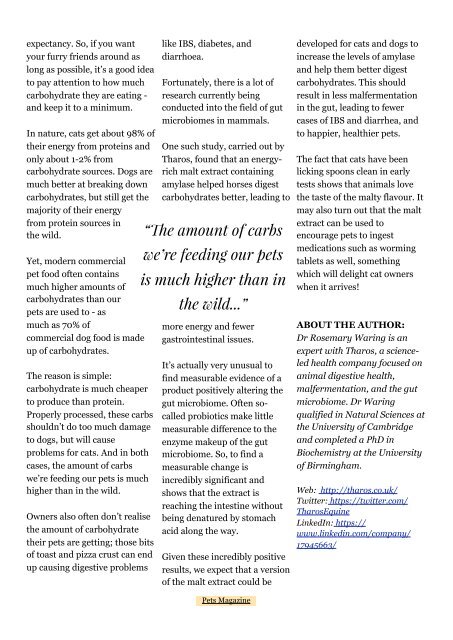Pets Magazine November 2018
This month, we feature MOJO, Instagram's newest canine star; Pet Horoscopes by Russell Grant; an expert on how to look after your pets' digestion & improve their long-term health & happiness; our fantastic festive giveaway of a 3D printed sculpture of YOUR pet, and more inside!
This month, we feature MOJO, Instagram's newest canine star; Pet Horoscopes by Russell Grant; an expert on how to look after your pets' digestion & improve their long-term health & happiness; our fantastic festive giveaway of a 3D printed sculpture of YOUR pet, and more inside!
You also want an ePaper? Increase the reach of your titles
YUMPU automatically turns print PDFs into web optimized ePapers that Google loves.
Vet<br />
expectancy. So, if you want<br />
your furry friends around as<br />
long as possible, it’s a good idea<br />
to pay attention to how much<br />
carbohydrate they are eating -<br />
and keep it to a minimum.<br />
In nature, cats get about 98% of<br />
their energy from proteins and<br />
only about 1-2% from<br />
carbohydrate sources. Dogs are<br />
much better at breaking down<br />
carbohydrates, but still get the<br />
majority of their energy<br />
from protein sources in<br />
the wild.<br />
Yet, modern commercial<br />
pet food often contains<br />
much higher amounts of<br />
carbohydrates than our<br />
pets are used to - as<br />
much as 70% of<br />
commercial dog food is made<br />
up of carbohydrates.<br />
The reason is simple:<br />
carbohydrate is much cheaper<br />
to produce than protein.<br />
Properly processed, these carbs<br />
shouldn’t do too much damage<br />
to dogs, but will cause<br />
problems for cats. And in both<br />
cases, the amount of carbs<br />
we’re feeding our pets is much<br />
higher than in the wild.<br />
Owners also often don’t realise<br />
the amount of carbohydrate<br />
their pets are getting; those bits<br />
of toast and pizza crust can end<br />
up causing digestive problems<br />
like IBS, diabetes, and<br />
diarrhoea.<br />
Fortunately, there is a lot of<br />
research currently being<br />
conducted into the field of gut<br />
microbiomes in mammals.<br />
One such study, carried out by<br />
Tharos, found that an energyrich<br />
malt extract containing<br />
amylase helped horses digest<br />
carbohydrates better, leading to<br />
“The amount of carbs<br />
we’re feeding our pets<br />
is much higher than in<br />
the wild...”<br />
more energy and fewer<br />
gastrointestinal issues.<br />
It’s actually very unusual to<br />
find measurable evidence of a<br />
product positively altering the<br />
gut microbiome. Often socalled<br />
probiotics make little<br />
measurable difference to the<br />
enzyme makeup of the gut<br />
microbiome. So, to find a<br />
measurable change is<br />
incredibly significant and<br />
shows that the extract is<br />
reaching the intestine without<br />
being denatured by stomach<br />
acid along the way.<br />
Given these incredibly positive<br />
results, we expect that a version<br />
of the malt extract could be<br />
<strong>Pets</strong> <strong>Magazine</strong><br />
developed for cats and dogs to<br />
increase the levels of amylase<br />
and help them better digest<br />
carbohydrates. This should<br />
result in less malfermentation<br />
in the gut, leading to fewer<br />
cases of IBS and diarrhea, and<br />
to happier, healthier pets.<br />
The fact that cats have been<br />
licking spoons clean in early<br />
tests shows that animals love<br />
the taste of the malty flavour. It<br />
may also turn out that the malt<br />
extract can be used to<br />
encourage pets to ingest<br />
medications such as worming<br />
tablets as well, something<br />
which will delight cat owners<br />
when it arrives!<br />
ABOUT THE AUTHOR:<br />
Dr Rosemary Waring is an<br />
expert with Tharos, a scienceled<br />
health company focused on<br />
animal digestive health,<br />
malfermentation, and the gut<br />
microbiome. Dr Waring<br />
qualified in Natural Sciences at<br />
the University of Cambridge<br />
and completed a PhD in<br />
Biochemistry at the University<br />
of Birmingham.<br />
Web: http://tharos.co.uk/<br />
Twitter: https://twitter.com/<br />
TharosEquine<br />
LinkedIn: https://<br />
www.linkedin.com/company/<br />
17945663/





